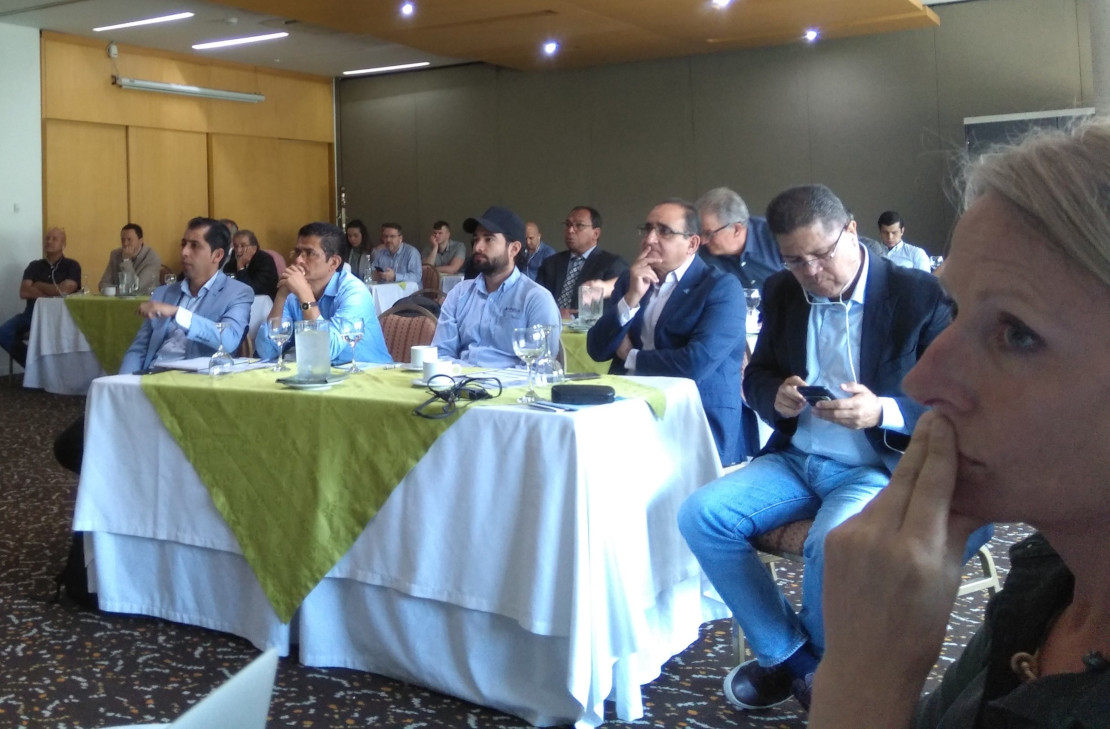HYPOSO Framework Condition Workshop in Colombia

Focused participants of the Workshop on Framework Conditions for Small Hydropower in Colombia in Medellín
On 28 February 2023, the fourth of five HYPOSO Workshops on the Framework Conditions for Small Hydropower took place in Medellín, Colombia. It was organised by the local project partner CELAPEH, together with the local based organisation Sociedad Antioqueña de Ingenieros y Arquitectos – SAI. Altogether, 45 participants gathered to get updates and information about the SHP sector, from political institutions (government, regulatory and environmental authorities), project owners and developers, electric utilities with a SHP portfolio, European manufacturers and suppliers, as well as engineering companies, associations, and consultants.
The agenda was structured to allow for a maximum active participation of the attending stakeholders and was divided into following blocks:
1. Introduction about the HYPOSO Project, including 5 presentations to inform about objectives, the tools developed, the work done and the work to be done
2. Four discussion panels, each one dedicated to issues related to one of above mentioned specific stakeholder groups.
3. A plenary session focused on the barriers to SHP development and recommendations to eliminate or mitigate such barriers.
4. A closure statement from HYPOSO representative (Ewa Malicka)
The Panel blocks allowed for a very intense exchange of useful opinions and information. The panelists of each stakeholder group were requested to answer questions from other stakeholders groups, thus enhancing a better understanding of each others role and activities.
During the plenary session, every participant had the opportunity to make a short comment on a specific issue, achieving a 100% active participation. Each participant also contributed with its knowledge and expertise to a better and more comprehensive understanding of SHP problems and corresponding solutions.
As a result, the main barriers affecting the SHP potential development were identified. The most recurrent of such barriers were:
a. Environmental license procedure is long and demanding (environmental authorities participants acknowledged and mentioned that reforms are under preparation)
b. Regulatory norms were developed for large hydro and are difficult to fulfill by small hydro. Once again, regulatory norms are under revision.
c. As a result from a. and b., pre-feasibility studies for SHP are relatively higher than for LH and many project developers are reluctant to make required pre-investments
d. Social concerns and community’s opposition are growing rapidly, as a consequence of environmental and social impacts of large hydro plants, and communities hardly understand differences between large and small hydropower plants.
e. SHP owners budget for O&M capacity building is in many cases reduced or neglected, and frequent shut downs and damages are the result of poor O&M personnel qualification.
f. Manufacturing and repair facilities for spare parts are scarce, and quite often spare parts must be imported, leading to even longer shut down periods.
g. As a consequence of the above mentioned shutdowns and damages, electricity generation and revenues decrease, in many cases to such a point where capital debt can not be repaid, and power stations are abandoned.
h. Government authorities do not recognize the importance of SHP as a reliable and regular source of clean energy and give preference to other sources, mainly solar, wind and biomass. As a consequence, fiscal incentives and financial resources are mainly allocated to such energy sources.
i. Solar, wind and biomass (also large hydropower) enjoy strong support from powerful lobbies and industries to influence government policies according to their interests. This is not the case of SHP, which is regarded as the ugly duck of the renewable energies family, without a lobby or organization able to bring SHP concerns to the government.
